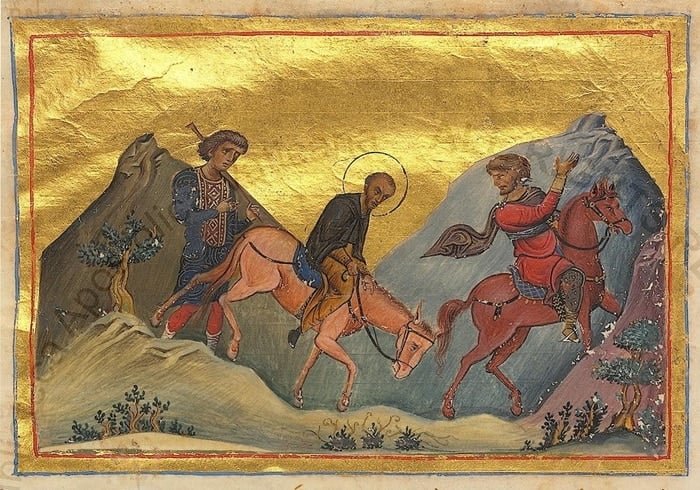
Saint John Chrysostom, whose memory the Orthodox Church honors today, November 13th, is one of the most brilliant and beloved figures in the history of the Church.
Born in Antioch, Syria, around 349 AD. His father died young, and he was raised by his pious mother, Anthousa (venerated as a Saint herself). He received a superior education, studying rhetoric under the famed pagan sophist Libanius.
He earned the epithet “Chrysostom” (meaning “Golden-mouthed”) due to his unparalleled eloquence, the clarity of his message, and the compelling spiritual depth of his sermons.
Chrysostom becomes an Archbishop in Constantinople
In 398 AD, he was brought—against his will—to Constantinople to become the Archbishop. There, he used the archdiocese’s immense wealth to found hospitals, poorhouses, and institutions for the needy, dramatically curbing the lavish lifestyle traditionally associated with the episcopal seat.
Chrysostom’s ministry was defined by his fierce commitment to justice, charity, and ethical living. He was utterly uncompromising in denouncing the extravagance and moral corruption of the wealthy elite and the imperial court.
His strict moral scrutiny led to a direct and ultimately fatal conflict with the powerful Empress Eudoxia.
Despite his popularity among the common people, he was twice exiled through political machinations instigated by his rivals and the Empress. He died during his enforced, strenuous journey to his second exile location at Comana in Pontus on September 14, 407 AD.
His final recorded words, reflective of his profound spiritual surrender, were: “Dóxa tô Theô pánton héneken” (Glory to God for everything).
Enduring theological and liturgical legacy
Chrysostom’s voluminous literary output is central to Eastern Orthodox theology:
The Divine Liturgy: The Divine Liturgy of St. John Chrysostom is the primary form of the Eucharist celebrated by the Orthodox Church worldwide.
On the Priesthood: His work, Six Books on the Priesthood, is a foundational text of pastoral theology, detailing the weighty responsibilities and challenges of the clerical office.
Sermons and Homilies: He is renowned for his extensive biblical commentaries and homilies, emphasizing social justice and the imperative of charity (eleemosyne), earning him the title, the “Prophet of Philanthropy.”
One of the Three Hierarchs
He is also commemorated alongside St. Basil the Great and St. Gregory the Theologian as one of the Three Hierarchs.
They are celebrated together on January 30th and are collectively regarded as the Patrons of Education and Learning throughout the Orthodox world.

